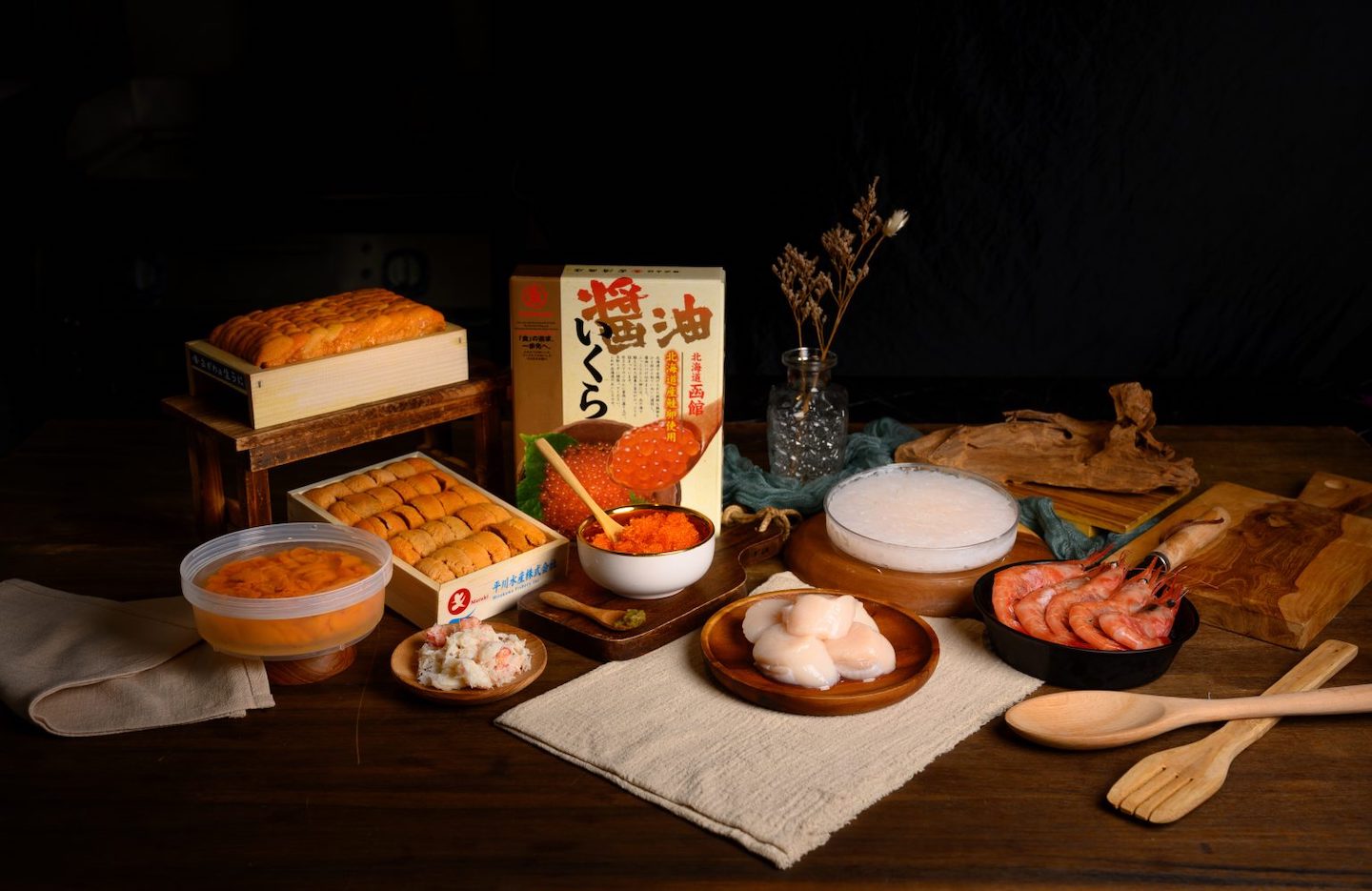
Oonee peddles a variety of gourmet ingredients, from Japanese wagyu to seafood flown directly from Toyosu Wholesale Market in Tokyo (Photo: Oonee)
Ordering from boutique food businesses are all the rage in these challenging times. And why not? It makes perfect sense. Items are prepared in small batches with tender loving care while the ingredients and creative process are personally overseen and inspected by the business owners. And, of course, it can all be delivered to your doorstep — there is no need to venture out, should you so wish. Here are a few of our favourites (coincidentally, all female-run too) and, judging by the resounding response they are seeing, the discerning public’s too, it would seem.
Oonee
Quality food purveyor specialising in seafood, meat and gourmet ingredients
In Malaysia, finding passionate foodies is not hard but, to find two very young, passionate foodies who are exceedingly well-versed in culinaria and its accompanying and often very expensive ingredients is somewhat rarer. For Tan Pei Jun and Gigi Leow, however, it was a given. “We love good food and experimenting at home,” they say.
“We set up Oonee in November 2019, as Gigi often had to buy wagyu and Japanese seafood whenever she travelled to Singapore for work, owing to the lack of available options in Malaysia. So, we saw the potential,” says Tan. “We wanted to make it convenient for Malaysians who love cooking at home to do so using high-end premium foods, which many of us appreciate and enjoy. With some of my family’s connections in both Japan and Malaysia (Tan’s parents are IGB’s Tan Boon Lee, founder of established fine-dining rooms Cilantro and Sage, and Low Su-Ming of the Low Yat Group), we were able to be introduced to people who could help us source for quality products, which we would then distribute.”
20201009_peo_from_left_gigi_leow_and_tan_pei_jun_of_oo-nee_ky.jpg

Oonee’s quirky name, as all foodies worth their amethyst bamboo salt would recognise, comes from the Japanese word for sea urchin. “It made sense as uni was one of our star products. In Japanese, it could also mean ‘sisters’. Although Gigi and I met just two years ago, we immediately ‘clicked’ and have since become very close, almost like sisters,” smiles Tan.
The business, which specialises in premium gourmet ingredients, grew slowly and organically — concentrating initially on two main ingredients (Japanese wagyu and sea urchin) — through Instagram and WhatsApp, as it was a simple and convenient platform for Tan and Leow, who still hold full-time jobs. “Online sales also require the least start-up costs and, as all our products are by pre-order, with customers required to pay upfront, it allowed us to slowly generate cash flow to pay for our operational items, such as packaging and other branding materials,” say the savvy duo.
With their youthful flair and a keen understanding of marketing, Tan and Leow also introduced their catchy “Homakase” concept, their own creative portmanteau of the words “home” and “omakase”, Japanese for “chef’s choice”, exhorting their clientele to create fine-dining meals in the comfort of their own living spaces. “It was during the lockdown period, and we were pleasantly surprised when our customers proudly sent us photos of their creations. I can tell you, the food looked like restaurant-standard dishes! We thought the term ‘homakase’ was perfectly in sync with what our business is all about.”
It was also during this time of restricted movement that Oonee saw its business grow exponentially. “It was mostly through word of mouth,” the girls acknowledge. “People had time on their hands, browsing through social media and keen on cooking. We ensured our Instagram page was up to date, featuring cooking and lifestyle inspirations and recipes. The MCO (Movement Control Order) period enabled us to get our name out there and slowly establish Oonee as a purveyor of quality foods.”
Those new to Oonee would find their Homakase gift boxes a godsend, comprising a variety of items that will allow anyone to whip up an impressive meal at home. “At Oonee, we work very closely with our suppliers to find out what’s in season so we can then share it with our customers. Right now, we are working on different Homakase packages at different price points to be launched for the upcoming festive season — perfect to send as gifts or care packages, if people are still hesitant about going out to eat.”
20201009_peo_product_from_oo-nee_ky.jpg
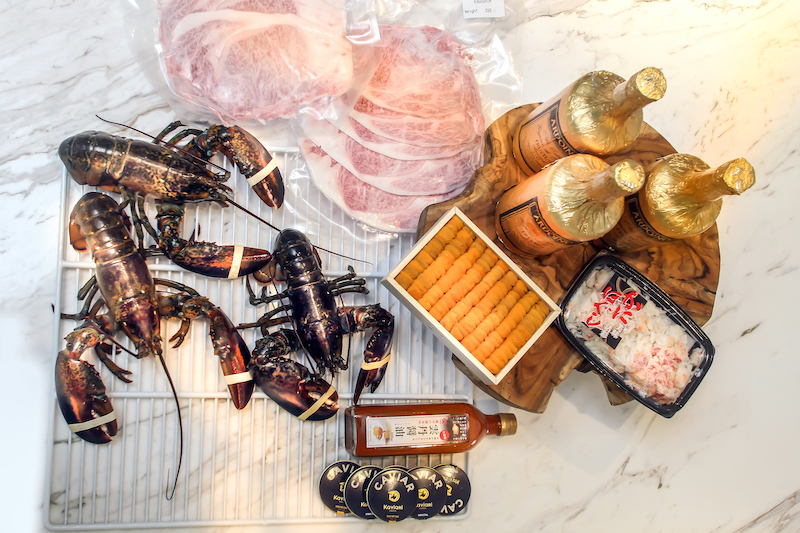
With business doing well enough, plans are now underway to expand it further. Oonee’s first retail outlet just opened at Riverwalk Village in Jalan Sultan Azlan Shah (formerly Jalan Ipoh) and the outfit has a proper e-commerce website as well. “You can view our full range of products and shop at your own convenience online or come to the store. We plan to host cooking demos and small pop-up events to introduce new products or for our clients to try their hand at learning new techniques. Our vision for Oonee is not just a business selling high-end ingredients but also one that offers customers a holistic experience that they can enjoy at home,” says Tan. “We have also connected with a delivery partner and will offer customers a choice of door-to-door delivery or self-pickup from our store. That was why we decided to establish a physical presence to give our customers a sense of trust and confidence, as what we sell isn’t by any means cheap.”
Currently, the most premium item carried by Oonee would be its Hadate Murasaki Uni, priced at RM2,200, but just reading through its list of products is enough to whet one’s appetite. There are Adoino cold-pressed olive oil, caviar, deshelled raw lobster from Canada and Europe, engawa — that wonderful thin muscle found in the fin of the halibut that is as rich and buttery as a slice of tuna belly and which Tan swears is easy to handle and cook — among a host of other good things.
It comes as no surprise, then, that both the girls have their own favourite things and ways of preparing and using their supply of fine ingredients. “I really enjoy making dons,” shares Tan, referring to donburi, the Japanese method of serving fish, meat or vegetables in a bowl over rice. “And I love using Oonee’s botan ebi prawns, hotate (scallop) and, of course, uni. Our selection of sashimi-grade frozen seafood is also really convenient, as it can keep for a month in the freezer. Simply defrost whenever you feel like enjoying sashimi at home. It also makes it super simple to put together a carpaccio dish. Splash it with truffle oil to make it all the more decadent.
“Our products are meant for sharing, so we like to think that Oonee makes it easy for a small group of friends or family to come together and have fun cooking, and eating, something nice. And that’s precious.”
One of the cardinal rules when it comes to mapping out a successful business model has always been to create ongoing value for customers. It would seem, then, that Tan and Leow have got it all down pat.
Order here.
Cafe Gabriella
Artisan baker specialising in what is arguably the Klang Valley’s best caramelised onion tart, berry frangipane and loaded loaf
“When the MCO began, I suddenly found myself having to prepare three to five meals daily, as my children, who were away at boarding school, had to come home. I would say they were really my first two customers,” says Gail Khong. “To spice things up, as we were unable to dine out, I wanted to replicate the experience at home. The children are my harshest critics, so I was determined to ensure they had a good experience daily. As I was already cooking and baking every day, I decided to set up an Instagram page for my home café, which I christened Cafe Gabriella, to document my journey. Besides, it was a childhood dream of mine to run an F&B business. I chose the name Gabriella, which was given to me by my Italian tour guide during a Mediterranean cruise holiday. Thereafter, whenever I hosted dinners with a European theme, my family would say they were dining at Casa Gabriella.”
20201009_peo_gail_khong_1_msy.jpg
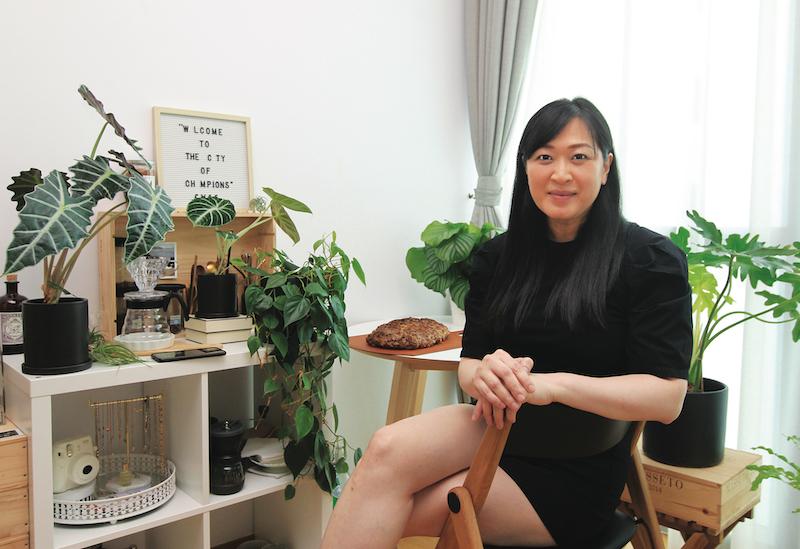
Although Cafe Gabriella’s menu is limited to just a few items, Khong more than makes up for it in sheer quality. Her star product of loaded loaves, packed with fruit and nuts, actually came about when her husband requested something less carb-heavy. “He’d wanted something similar to what we had almost 10 years ago at Alkimia, a one Michelin-starred restaurant in Barcelona. The loaf was so good that, even after so many years and many more amazing meals at various restaurants, we still crave it. So, I was determined to make something similar.” If you have yet to try it, you simply must. Khong has a generous hand and packs each loaf with an abundance of walnuts, olives, cheese, figs, raisins and tomatoes and other good things, with just a smidgen of dough to hold it all together. “Many tell me it’s very addictive and how each bite gives a different flavour,” says Khong. “Some call it the ‘Cheeseboard Loaf’ or ‘A Sandwich in a Loaf’. I usually eat it as is, but others love slathering French butter onto a toasted slice.”
The caramelised onion tart has always been a crowd-pleaser at Khong’s dinner parties, and the berry frangipane is the most recent addition to her repertoire. “It’s the item most requested by family members for gatherings. I had a few customers lament that, whenever they brought a frangipane to a gathering, they hope to bring leftovers home but, alas, it never happens,” shares the self-taught baker, who scours the internet, magazines and cookbooks for recipes and ideas.
20201009_peo_gail_khong_9_msy.jpg
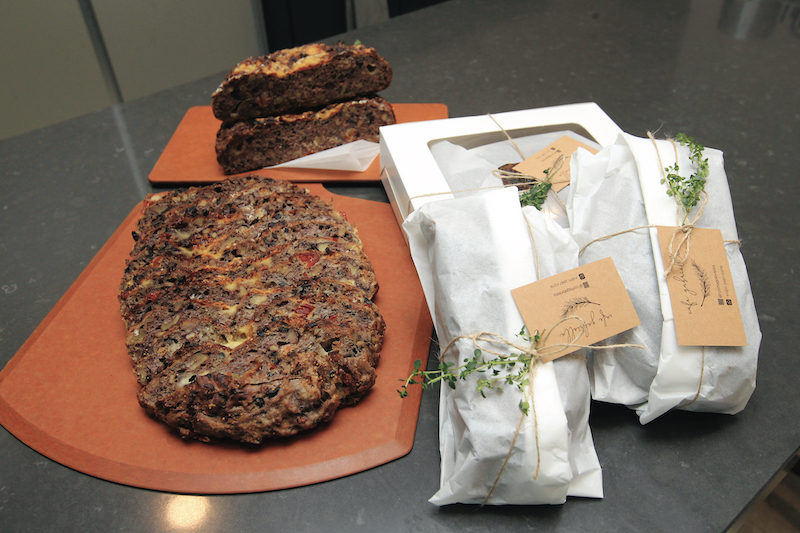
“My favourite way to enjoy my bakes is when I am hosting at home with good company and over a few bottles of wine. I don’t have a favourite item, but I would say the loaf is uniquely mine as I have yet to come across one that is so loaded yet bound by so little dough. I hardly ever baked bread before, as there was no need to, considering the variety available. But the MCO changed everything.
“Cafe Gabriella was born out of passion and a love of food. I still remember the croissants from the Pastelería Hofmann in Barcelona, where they remained good even after my flight back to KL. I also fondly think of amazing, buttery spiral-shaped escargot pastries from Rituel in Tokyo and the Boulangerie Pain Stock in Fukuoka for its huge array of bread and pastries — all excellent! For the moment, Cafe Gabriella will remain a small artisan bakery, with every item handmade by me. I have no intention of taking the fun and fulfilment out of this baby. Additional items to the menu will solely depend on the response of my ‘guinea pigs’. A product will be rolled out only if it gets their seal of approval — that is, when they keep asking for more or when a figure-conscious person throws his or her diet out of the window for it!”
Order here.
Butter Me Up
A boutique butter-maker
“I was one of those affected as a result of the pandemic. It was a series of unfortunate incidents for me, as I had just purchased a home, and then was out of work, with no chance of securing another equivalent role. I was worried, as I had bills to pay. Every day, I lived as if without purpose,” says Ziling Lim. “Before the pandemic, I was a busy, corporate person who flew almost weekly, as I was holding a regional role. I then decided to keep myself busy by taking digital marketing e-learning classes, working out religiously and even learning to cook as the MCO wore on. I never really knew how to prior.
“When the RMCO (Recovery MCO) came into effect and we could slowly venture out again, a close friend of mine suggested I start a business, mentioning butter in particular. It was either that or bottled cocktails.” Lim says the latter was a viable option as her sister, Eiling, is an independent whisky bottler herself. “I love to wine and dine and, as my background is in independent watchmaking, I thought handcrafted butter is very complementary as both are boutique and artisanal crafts.
sam-9212.jpg
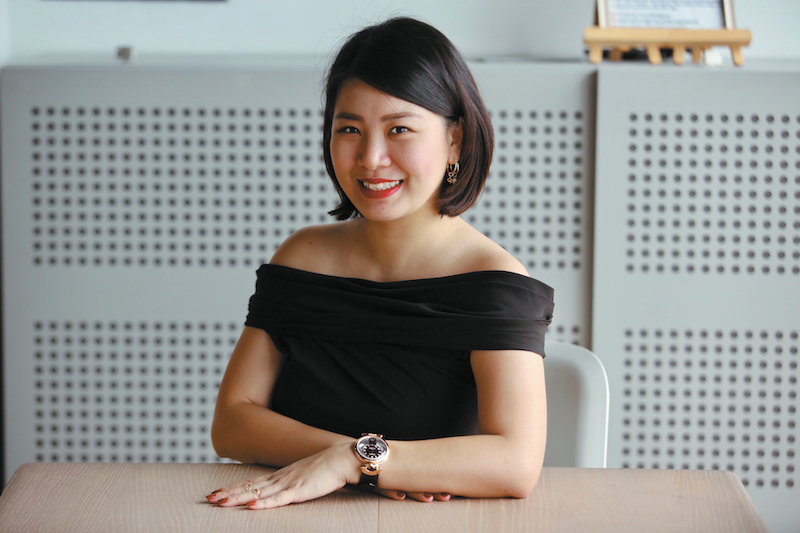
“The very day of my friend’s suggestion, I began researching, going to the supermarket to grab some ingredients, and started to experiment in my kitchen. I also began researching my potential customer demographic — who would most likely purchase handcrafted butter — and then channelled all my energy into creating my product. Some of my friends and family would also constantly check on my progress, as they were so excited and keen for me to start selling my butter. I failed the first few attempts, but gradually improved after collecting feedback from friends who were forced to be test subjects. To cut a long story short, Butter Me Up was born at the end of June 2020.”
With just RM6,000 in start-up capital, all of which was spent on ingredients and basic equipment, Lim spent the rest of her time testing flavours out as well as different techniques on how to churn butter properly. “The cost of ingredients to make a good butter is high, as they are mostly imported,” she explains. “I refuse to budge when it comes to ingredients or quality. If it is not something I would eat myself, then I definitely won’t offer it to others.”
Judging from Butter Me Up’s intriguing flavours, resistance might be futile. With five flavours currently on offer, those with a fat tooth would be delighted to see cleverly and cheekily named butters such as Hit Me Bacon One More Time, bacon butter inspired by the Britney Spears hit song; and Every Kombu In The World, a umami-packed offering named after Air Supply’s Every Woman in the World. Fans of the late Taiwanese songbird Teresa Teng would be well pleased to explore Lim’s latest butter, a seasonal offering, called The Moon Represents My Salted Egg. “Funnily enough, I get flavour ideas when I sleep,” laughs Lim. “I also don’t want my butters to be seen as a snobbish product or taken too seriously, thus they are named after popular songs.”
sam-9215.jpg
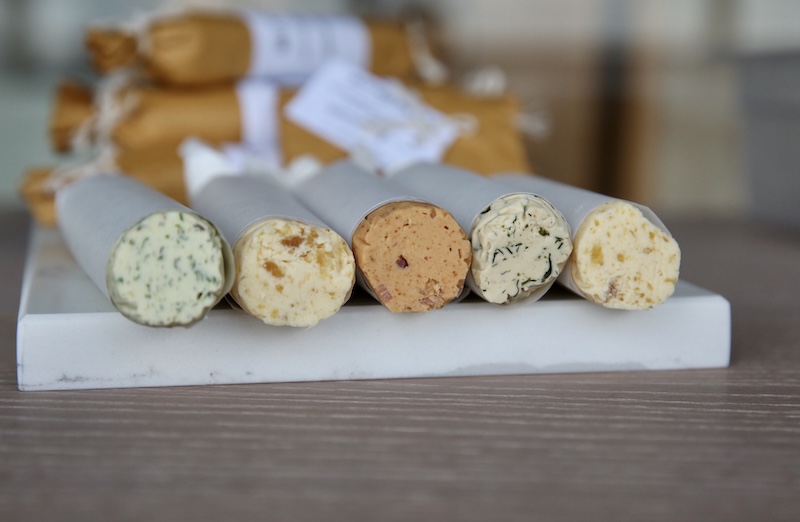
What works in Lim’s favour is that butter is also an amazingly versatile product. Besides being an indulgent spread for baked goods, it is also wonderful in cooking. “Use it to baste your steak, enjoy it on a corn cob, stir it into pasta or sauté with prawns or chicken. Butter adds depth to the flavour profile of the dish, besides being an amazing low-carb and keto-friendly food,” she suggests. “I love my butter with sourdough, croissants, ciabatta and non-salted water biscuits, although a friend added my salted gula melaka butter into a freshly brewed cup of Moka coffee, which she absolutely loved.”
Prices start at RM20 for about 100g, although seasonal-flavoured butters are priced slightly higher, at RM25. They are sold strictly online on Instagram and Facebook, and customers may collect their butters from Mont’Kiara or arrange for them to be delivered anywhere in the Klang Valley for a small fee.
“Eventually, I would love to expand and see my products in selected restaurants or gourmet cafés or even for private catering and parties, but I am in no rush, as I would like to properly map out my plans before jumping blindly into things,” Lim says. “I am still active in the local haute horlogerie circle, as I believe it’s the perfect demographic to enjoy and appreciate artisanal produce.” Besides butter, the enterprising Lim is offering her own handcrafted seasoned salt as well as privately flown-in raw, natural Persian honey. “I have plans to launch handcrafted flavoured cheese, but am still trying to get the taste profile right. Having said that, butter will always remain my core product, with new seasonal flavours to ensure my clientele remains constantly intrigued with new products and tastes.”
Order here.
Yang Kee Kitchen
Known for abalone lor mai kai
“I began selling lor mai kai (steamed glutinous rice) towards the end of the MCO. I was just experimenting, as there was nothing else to do,” says Singdy Yang. “I liked eating, so I began cooking. Abalone lor mai kai was already trending in Singapore, but I noticed how no one was making it here. So, I tried it out and my experiments turned out pretty well. In fact, I was happy with the outcome after just five tries.”
Although Yang makes it sound like a doddle, making lor mai kai is actually labour-intensive; even more so, considering Yang Kee Kitchen’s lor mai kai is cooked only in small batches. “I have a minimum order of four portions at RM15 each, but the biggest order I received was for 120 portions,” she smiles.
The smart paper bags it is delivered in, in a most auspicious shade of red, was sourced by Yang on the world’s biggest e-commerce site, the Alibaba-owned Taobao, while the branded stickers were done at a shop in nearby Publika. “It was only the foil cases that took some time to source. Most people might not know it, but eating lor mai kai this way is unique to Malaysia and Singapore. In China, glutinous rice is always steamed in lotus leaves, and that’s why I couldn’t find the foil cases on Taobao,” laughs the resourceful Yang. “It took some time and searching, but I have since found a local manufacturer after first buying them online from Shopee.”
20200814_peo_yangkee_kitchen_lo_mai_kai_4_sam.jpg
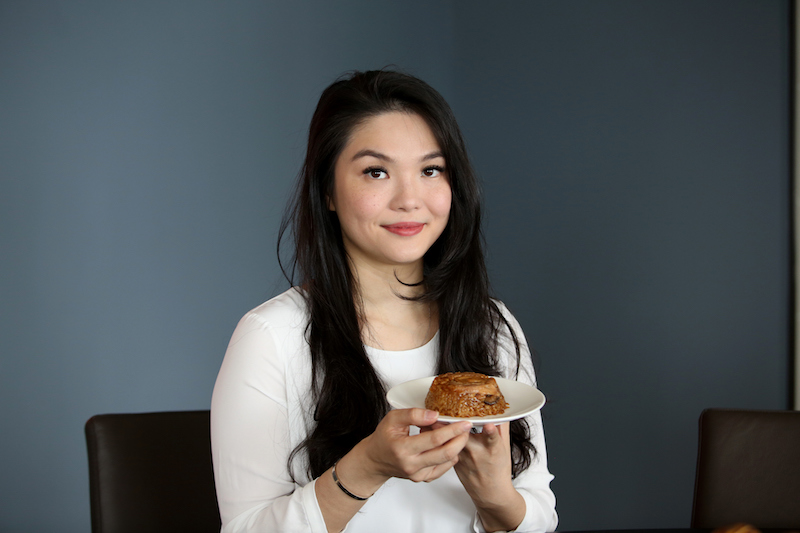
Launched at end-May, Yang Kee Kitchen stands out for its use of abalone in its steamed glutinous rice, versus the local dim sum favourite, which uses only chicken. “The response for abalone has been excellent,” Yang acknowledges. “But I also use chicken, albeit only free-range ones, as well as flower mushrooms and locally sourced lap cheong (Chinese sausage). The abalone itself is from the A1 factory,” she says, referring to the company specialising in a variety of food products, including soups, spices, sauces, instant noodles and, of course, canned abalone.
Yang Kee Kitchen’s abalone lor mai kai begins with the overnight marination of key ingredients, after which it is steamed. “I still use my single three-tiered steamer, which can steam 30 pieces at a go. So, if it’s a big batch or an order that exceeds 100 units, the steaming process alone will take me more than four hours,” she says.
With Yang taking care of all the hard work, all one needs to do to enjoy a comforting yet luxurious meal (or snack, depending on the voracity of appetite) is just to steam a portion for four to five minutes if from the fridge. “The trick is not to oversteam, lest the rice turns mushy or the abalone hard,” she cautions.
Yang, who recently gave up a career in cosmetics, had always enjoyed cooking for family and friends. “I told my husband that, if we could afford it, I wanted to spend more time with our children while they were still small,” says the mother of a four-year-old girl and a two-year-old boy. “This was because my own parents started their business from zero and I hardly ever spent time with them while growing up. But, of course, I soon got bored and wanted something to do … although everyone who knows me well still tells me they could never imagine me selling lor mai kai! My dad was the first person to laugh, asking whether I was sure, although I would say he is very proud of me now.”
20200814_peo_yangkee_kitchen_lo_mai_kai_5_sam.jpg
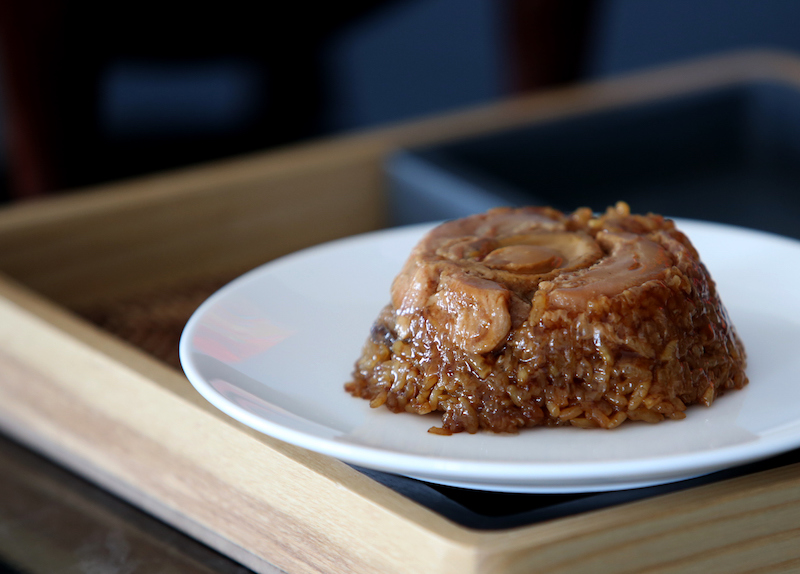
In August, Yang launched a mala chilli version of her abalone lor mai kai as well. “I love eating mala, that’s why,” she says. “But this version is very flavourful, not the super spicy, tongue-numbing one you’d normally expect. It is not so hot until it’s a torture to eat! I am also toying with the idea of a version in millet, as it is lighter and healthier, in response to some customers’ requests.
“My grandmother is Shanghainese so I cook a lot of comfort food. Lor mai kai has always been a favourite in the family. In fact, my childhood favourite was one that could be found in my father’s hometown of Sungai Siput. I like the one at Ming Room too, although their version is noticeably sweeter than mine. My family used to love eating my lor mai kai, but I think they overdosed, so they are a bit afraid of it right now,” adds Yang chuckling.
On plans to expand the business, she is hesitant, saying: “My audience is a niche market. Besides, I still want balance in my life and time for my children. Right now, things are still manageable. I am pleased to say I have orders every day. I marinate the ingredients the night before, and just put them together and steam it while the kids are at school. So, it’s easy.
“Of course, I’d love to expand and grow the business if I could. So, if stores and restaurants are willing to accept my price point, I am more than happy to welcome collaborations.” To other hesitant entrepreneurs who have yet to take the plunge, Yang is encouraging. “Just think of your starting points. For me, I just wanted to try selling and then see where it goes. Do not be afraid. You’d be surprised at how things go. Just look at me! I am still surprised!”
Order here.
This article first appeared on Oct 19, 2020 in The Edge Malaysia.


